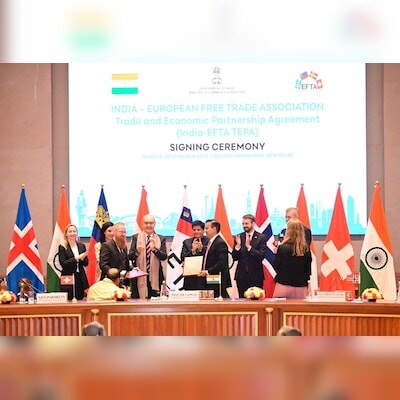Each of the signatory countries will have to ratify the pact for it to come into effect. | File photo
Switzerland’s federal cabinet has adopted the ambitious trade pact between India and the European Free Trade Association (EFTA) and submitted it to Parliament as part of the ratification process.
The ambitious trade pact, signed in March between India and the European bloc comprising Norway, Switzerland, Iceland and Liechtenstein, aims to expand trade in a range of areas including pharmaceuticals, manufacturing, new technologies and machinery.
Under the mega trade deal, the four European countries plan to invest $100 billion in India over the next 15 years.
Each of the signatory countries will have to ratify the pact for it to come into effect.
On Wednesday, the Federal Council adopted a communiqué on the free trade agreement between the EFTA countries and India, the Swiss government said in a statement.
The Federal Council, which is the Swiss federal cabinet, is the country’s highest executive authority.
The Swiss parliament is expected to debate the issue in the upcoming winter or spring sessions, the statement said.
“The agreement strengthens the competitiveness of Swiss exports in the most populous country in the world,” he said, describing the consolidation of the trade pact with India as a significant milestone in Swiss trade policy.
“In its statement, the Federal Council praises and outlines the content of the agreement and places it in the general context of Switzerland’s relations with India,” the Swiss government said.
He also explained the importance of the trade agreement.
“India is currently the most populous country in the world. In particular, the growing middle class means that there is significant potential for growth. However, India still applies very high import tariffs on most products,” he said.
The agreement provides for the elimination of customs duties on almost 98 percent of imports from India.
“After 16 years of negotiations, Switzerland and the other EFTA states have succeeded in becoming the first European partners to conclude a free trade agreement with India,” the Swiss statement said.
“Once the agreement enters into force, 94.7 percent of current Swiss exports to India will benefit from tariff reductions, in some cases with transitional periods. This will strengthen the competitiveness of Swiss exports in India,” he added.
The agreement includes a chapter on investment promotion and cooperation.
“For the first time in a free trade agreement, EFTA states are committed to undertake a range of promotional activities with the aim of increasing investment in India and thereby creating jobs,” the statement said.
“India, for its part, is making efforts to ensure a favourable investment climate,” he added.
The statement notes that EFTA is also the first partner with which India has agreed a comprehensive and legally binding chapter on trade and sustainable development.
“This chapter includes, among other things, a commitment not to deviate from applicable environmental and labour standards. It also establishes a specific subcommittee on trade and sustainable development,” he said.
(Only the headline and image of this report may have been reworked by Business Standard staff; the rest of the content is auto-generated from a syndicated feed.)
First published: September 5, 2024 | 17:23 IS
Disclaimer:
The information contained in this post is for general information purposes only. We make no representations or warranties of any kind, express or implied, about the completeness, accuracy, reliability, suitability or availability with respect to the website or the information, products, services, or related graphics contained on the post for any purpose.
We respect the intellectual property rights of content creators. If you are the owner of any material featured on our website and have concerns about its use, please contact us. We are committed to addressing any copyright issues promptly and will remove any material within 2 days of receiving a request from the rightful owner.

